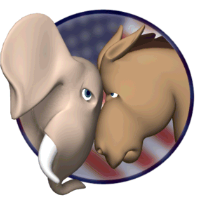In California, Democrats and Republicans are Farthest apart; In Louisiana, there is Barely a Difference

Even by the low standards of political harmony usually applied to Congress, state legislatures are, by comparison, generally considered tumultuous repositories of crazed partisans. But when it comes to measuring political polarization in the states, one legislature towers above the rest.
California.
While most state legislatures are more politically polarized than Congress, California has by far the biggest ideological gap between the two political parties, according to a recently published study.
Boris Shor and Nolan McCarty, two academics who specialize in measuring American Legislatures, wrote a paper in 2011 mapping the ideological landscape of state and national legislatures that utilized voting data from 1996-2008. Recasting that data, the two researchers conjured up a two-dimensional graph that measures the “ideological distance between the median of the Democratic and Republican parties in the state legislative chambers.”
The larger the median, the larger the ideological disparity between the parties. The congressional median is around 1.2. Louisiana is the least divisive state at 0.5.
California is literally off the grid, which only goes up to 2.5. California’s score looks to be around 3.0. The next closest to California is Colorado at 2.2.
California voters have passed laws in recent years meant to reduce the polarization, which leads to political gridlock. But the impact of redistricting and top-two primaries is not accounted for in the current study.
Alan Abramowitz, a senior editor writing at Sabato’s Crystal Ball in 2010, didn’t think the changes were going to help. California Republicans are as conservative as their brethren across the country and Democrats are far more liberal than their national counterparts. This contrasts with states like Louisiana, where the right-wing Republicans are nearly matched in their conservative values by the ever-striving Democrats.
Abramowitz also noted that the two parties in California are concentrated in different parts of the state. The divide is not the classic north-south split popularized in tales of water wars between the San Francisco Bay Area and Southern California; it’s between the liberal coast and conservative inland areas.
Abramowitz doesn’t think redistricting will make a big difference because the state wasn’t heavily gerrymandered to begin with. He also noted that Washington, the only other state to employ top-two primaries, experienced no change in polarization afterward.
While Abramowitz doesn’t think California polarization is going away any time soon, The American Prospect writer Abby Rapoport considers it irrelevant. “Because Democrats thoroughly dominate the state, it hardly matters; they can pass bills to force fracking companies to be more transparent or help give flexibility to transgendered students.”
That’s true, but because of state Constitutional restrictions requiring super-majority votes to raise taxes, pass emergency legislation, override gubernatorial vetoes and put constitutional amendments on the ballot, Rapoport’s analysis may prove ephemeral at best.
California is no stranger to legislative gridlock.
-Ken Broder
To Learn More:
State Legislatures and Polarization (American Legislatures)
The Legislature is Polarized Because We Are (by Mark Paul, California Fix)
Three Reasons Why State Polarization Is a Big Deal Abby Rapoport (by Abby Rapoport, American Prospect)
California Dreaming: New Primary System Unlikely to Reduce Partisan Polarization and Gridlock in Golden State (by Alan Abramowitz, Sabato’s Crystal Ball)
Updated Aggregate Data for Ideological Mapping of American Legislatures (by Boris Shor, Dataverse)
- Top Stories
- Unusual News
- Where is the Money Going?
- Controversies
- U.S. and the World
- Appointments and Resignations
- Latest News
- Trump to Stop Deportations If…
- Trump Denounces World Series
- What If China Invaded the United States?
- Donald Trump Has a Mental Health Problem and It Has a Name
- Trump Goes on Renaming Frenzy






Comments